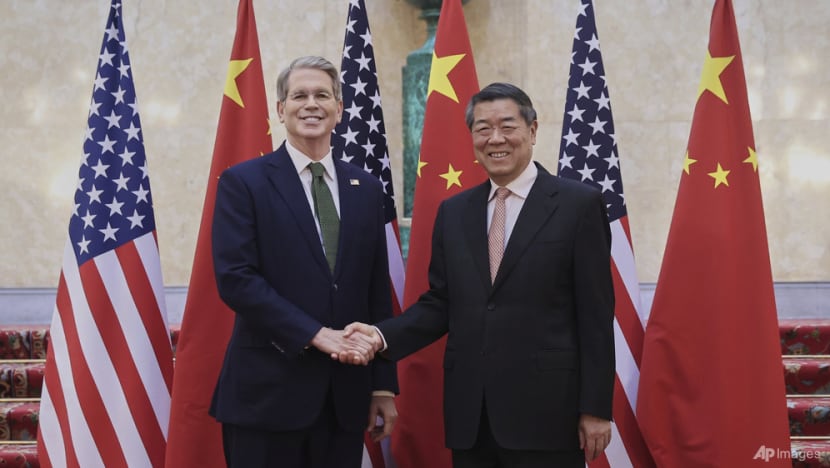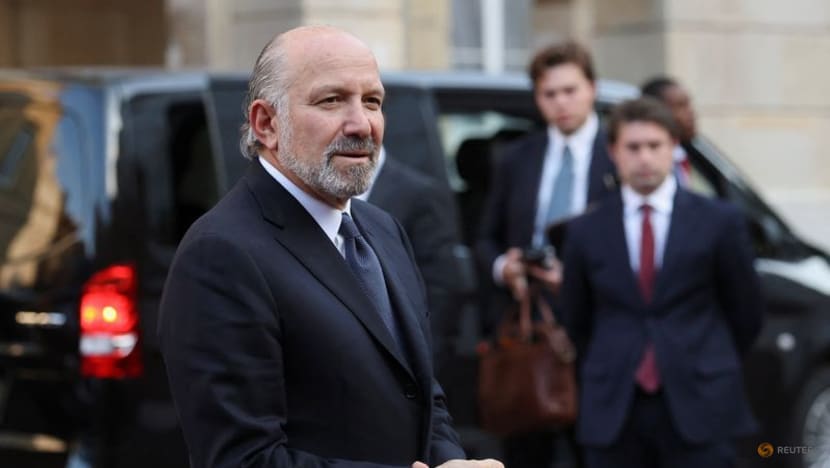Trump hails US-China trade deal as US stocks rally then slide

WASHINGTON: United States President Donald Trump on Wednesday (Jun 11) declared relations with China "excellent" after two days of trade talks yielded a framework agreement that included Chinese concessions on rare earth materials, along with Washington allowing Chinese students to study at US universities.
Posting on Truth Social, Trump said: "Our deal with China is done."
He noted, however, that it still required final approval from Chinese President Xi Jinping and himself.
Under the agreement, China will supply rare earth minerals and magnets vital to US industries, while Washington will allow Chinese students to remain in American universities, a reversal from earlier threats to revoke their visas.
"President Xi and I are going to work closely together to open up China to American trade," Trump added in a follow-up post.
US Commerce Secretary Howard Lutnick said the talks in London were "totally on the right track", adding that Beijing would begin approving US magnet applications immediately after formal endorsement of the agreement. "We will lift measures once China acts," he said.
Treasury Secretary Scott Bessent warned a broader deal with China would take a "longer process", saying it was possible to rebalance economic ties with Beijing only if Beijing proved a "reliable partner in trade negotiations".
And for partners "negotiating in good faith", Bessent told a congressional committee, there could be an extended pause before higher threatened tariff rates take effect in July.
MARKETS RESPOND AS TARIFFS, INFLATION CONCERNS EASE
Wall Street stocks initially rose as investors welcomed the China-US agreement, with the three main indices higher in late morning trading in New York.
But they fell later in the day in what Briefing.com called a "sell the news" response to the announcement, which it also dismissed as short of "groundbreaking".
"The two sides agreed to implement what was already agreed upon during a mid-May meeting in Switzerland," Briefing.com said.
The broad-based S&P 500, which rose the last three days, finished down 0.3 per cent at 6,022.24.
Elsewhere, London edged higher, supported by the government laying out its spending plans. But Paris and Frankfurt couldn't hold on to early gains and closed modestly lower.
Asian stock markets also won a lift on the China-US progress, with Hong Kong among the best performers.
"Constructive talks between the US and China have put markets on a firmer footing, as investors hope that the worst of the tariff turbulence may have passed," said Richard Hunter, head of markets at Interactive Investor.
Meanwhile, data showed little impact of Trump's tariffs on US consumer prices in May. Some analysts said it was still too early to discern a hit to prices from tariffs.
Between April and May, the consumer price index (CPI) rose 0.1 per cent. Analysts had expected it to continue at the 0.2 rate it rose in April.
Following the release of the data, Trump issued a fresh call for the Fed to lower interest rates.
Investors have worried that a tariff-driven surge in inflation could hinder the Federal Reserve from lowering interest rates to counter the slowdown in growth.
In other markets, oil prices shot up more than four per cent as Iran threatened to target US military bases in the region if conflict breaks out.
Amid escalating tensions, a US official said staff levels at the embassy in Iraq were being reduced over security concerns, while the UK Maritime Trade Operations, run by the British navy, advised ships to transit the Gulf with caution.

RARE EARTHS AND STUDENT VISAS AT HEART OF DEAL
The US-China agreement centres on easing trade friction around critical sectors. In recent months, Washington had expressed concern over slowing Chinese exports of rare earths, a key input in electric vehicles, wind turbines and military technology, after Beijing required new export licenses for domestic producers.
Under the tentative deal, Beijing will ease these licensing restrictions, but only for six months, giving China leverage in the next phase of negotiations.
In response, Trump said China would now supply "full magnets, and any necessary rare earths" up front.
China, for its part, had pushed back against US threats to revoke student visas, and Trump’s announcement confirmed that those enrolled in American universities would be allowed to stay.
Tariff levels under the framework agreement remain unchanged: US goods entering China face 10 per cent duties, while Chinese exports to the US are subject to an effective 55 per cent rate, including previous and new measures.
The agreement follows a 90-day truce negotiated in Geneva last month, which reduced earlier tariffs of 145 per cent on Chinese goods and 125 per cent on US exports.
"CANDID" TALKS
Rare earths are used in everything from electric vehicles to hard drives, wind turbines and missiles.
On Truth Social, Trump said China will supply "full magnets, and any necessary rare earths" up front.
Washington has also raised Beijing's ire by vowing to revoke the visas of Chinese students, a major source of revenue for US universities.
On Wednesday, Trump said: "We will provide to China what was agreed to, including Chinese students using our colleges and universities."
The US president added that the United States applies 55 per cent tariffs on Chinese goods. This is a combination of his 30 percent additional levies this year and the rough average of pre-existing duties, a White House official said.
He said Beijing charges 10 per cent duties on US goods.
The rates are the same as those that were previously agreed in the truce, which temporarily brought US tariffs down from 145 per cent and those imposed by China from 125 per cent.
In a Chinese state media readout released Wednesday, Vice Premier He Lifeng, who headed Beijing's team in London, stressed the need for both sides to strengthen cooperation in future dialogue.
Speaking to reporters in London, China International Trade Representative Li Chenggang said: "Our communication has been very professional, rational, in-depth and candid."












